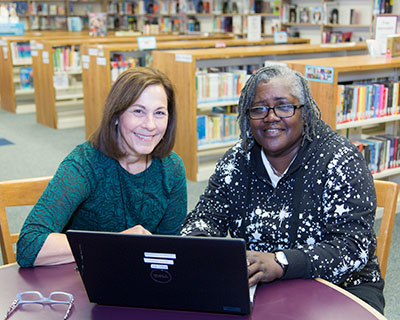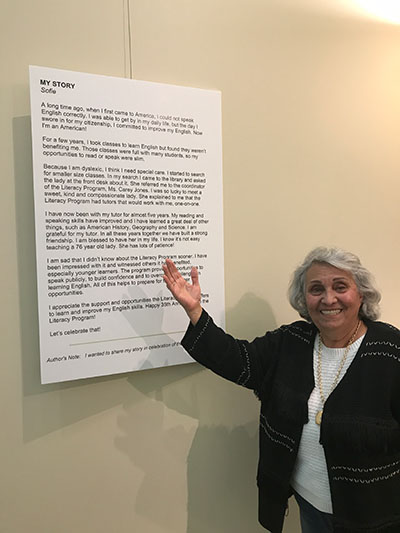“California Library Literacy Services Is Learner-Driven” is a core value for California Library Literacy Services. To meet this value, California Library Literacy Services uses the award-winning Roles & Goals Framework and Family Literacy Evaluation Framework to identify, measure, support, and celebrate learner growth and achievements. These data points and other information are collected on two reports each year.
Data Collection
California Library Literacy Services programs complete a mid-year report and a final report each program period. For these reports, programs report specific information to capture program success. The information required for these reports is available on the CLLS Manage Your Current Grant page.
Programs are responsible for selecting their own data collection system or platform to collect, maintain, and report data. View the sample data collection form (Excel) inspired by A.K. Smiley Public Library.
Tips for Data Collection
- Connect with your regional literacy network to discuss data collection methods
- Review old data files and reports to understand prior data collection methods and gain insight into historical program data
- Remember that data are a great way to communicate your program’s successes with stakeholders
- Data are also an important way to make data-driven decisions for program improvement and expansion
Roles & Goals
California Library Literacy Services is planned, implemented, and evaluated using a learner-centered framework called “Roles and Goals.” The framework helps staff and volunteers:
- Identify the goals that learners want to accomplish with their improved literacy skills.
- Deliver learner-centered instruction that is tailored to learners’ goals and aspirations.
- Track, acknowledge, and celebrate progress.
- Evaluate the impact of the library literacy program.
Goal setting empowers learners. It helps learners reflect on what brought them to the program, define what they want to work on, take ownership of their instruction, stay focused on what’s important to them, stay motivated, and build self-confidence.
The Roles and Goals framework is grounded in the belief, as stated by Ireland’s National Adult Literacy Agency, that literacy “involves listening, speaking, reading, writing, numeracy and using everyday technology to communicate information,” and that literacy, according to the National Center for Education Statistics, is “understanding, evaluating, using and engaging with written text to participate in society, to achieve one’s goals and to develop one’s knowledge and potential.”
Goal setting within the framework helps learners achieve success in their major life roles as lifelong learners, family members, workers, and community members.

Roles & Goals Resources
- Roles & Goals Introduction
- Roles & Goals Frequently Asked Questions
- Roles & Goals Guidelines
- Roles & Goals Form 2024-2025 (Excel)
- Roles & Goals Adult Role Map
- Roles & Goals Form for Collecting Evidence and Indicators of Achievement
- Roles & Goals Guide to the Learner Portfolio
- Roles & Goals Informational Webinar (June 2023)
Roles & Goals Curriculum
Learners’ aspirations and involvement drive the direction of tutoring in California Library Literacy Services. The Roles and Goals curriculum reflects many of the common learning goals that adult learners bring to library literacy programs. The curricula materials below, developed by literacy coordinators and volunteer tutors, support tutoring pairs in making goal-based instruction part of their lesson plans. They also correspond to the learning outcomes information that programs collect annually from tutoring pairs and report to the California State Library.
The links below will take you to Roles and Goals lesson guides. In some cases, the links will take you to instructional videos and other tutoring resources created to support meaningful learning in California Library Literacy Services that correspond to the Roles and Goals evaluation framework.
Lifelong Learner Outcomes
- Learn the alphabet, letters, and sounds
- Read a book, magazine, or news
- Write a letter, poem, story, or essay
- Use new technology skills
- Use the library
- Get a diploma
- Improve communication skills
Worker Outcomes
- Apply for a job
- Get a job or a better job
- Perform current job better
- Get a license or certificate for work
Home and Family Member Outcomes
- Read a book with a family member
- Help a family member with homework and studying
- Read a medicine label (or other health-related documents)
- Improve financial skills
- Build confidence speaking with or for my family
Community Member and Citizen Outcomes
- Access community resources (such as WIC, Medi-Cal/Medicare, CalFresh, or other services)
- Get involved in the community (such as volunteer at a community organization, school, place of worship, etc.)
- Get a driver’s license
- Become a citizen
- Vote
Other Goals
The following outcomes do not appear on the current Roles & Goals form. These goals can still be used in learning sessions. When reporting progress data on the final report, these goals will need to be mapped, or assigned, to the goal that is most similar.
- Learn math skills
- Write a note, message, or text
- Fill out a form or application
- Search for a job
- Interview for a job
- Use work related technology
- Read work-related material
- Write work-related material
- Take a family member to a library program
- Pay my bills
- Access help with family legal documents
- Communicate effectively with educators
- Communicate effectively with medical professionals
- Communicate effectively with family members
- Navigate systems and services
- Speak to others about the library literacy program
- Prepare to vote

Family Literacy Evaluation Framework
The Family Literacy Services evaluation framework is intended to:
- help programs capture their progress toward our commonly held vision for Family Literacy Services,
- help programs communicate their success and tell their stories in terms of the vision for Family Literacy Services, and
- support programs in planning and implementing Family Literacy Services for adults with low literacy skills and their families.
The evaluation framework’s tools and processes yield useful information for internal use by CLLS programs, align with existing timeframes and reporting processes, and correspond to the Family Literacy Services vision. The framework comprises:
- Family Outcomes from the Roles and Goals Framework collected during regular Roles and Goals evaluation conversations, for individual program use and reporting;
- Family Literacy Questions asked during regular Roles and Goals evaluation conversations, for individual program use;
- Reflection Forms used with all adults who participate in Family Literacy Services programming, for individual program use;
- An Impact Story about one family literacy adult learner each year, based on an interview with that learner, for individual program use and to develop success stories for reporting;
- Family Literacy Services questions on the California Library Literacy Services Annual Report.
1. Family Outcomes
For staff to ask adults who are enrolled in your California Library Literacy Services program and who have engaged in family literacy programming.
During your program’s Roles and Goals evaluation and goal re-setting conversations, collect the learner’s Roles and Goals Outcomes as you normally would. Report the goals they set, make progress toward, and achieve both in the Family Literacy Services section of the Final Report as well as in the general Roles and Goals section of the Final Report.
2. Family Literacy Questions
For staff to ask adults who are enrolled in your California Library Literacy Services program and who have engaged in family literacy programming.
Ask the Family Literacy Questions to family literacy participants during your program’s Roles and Goals evaluation and goal re-setting conversations. The Family Literacy Questions are available for download below.
Please note: You only need to ask adult learners these questions once a year to include in the California Library Literacy Services Final Report.
3. Reflection Forms
For staff to collect from all adults who take part in family literacy programming (those who are enrolled in your California Library Literacy Services program and others who are eligible-but-not-yet-enrolled).
After every focused Family Literacy Services program you offer inside or outside the library, (workshops, storytimes, crafts projects, etc.), it’s a great idea to gather reflections from all adult participants. The Reflection Forms are available for download below.
Some ideas programs might use to gather learners’ reflections include:
- Ask learners to stick post-it notes on the wall in a “yes” or “no” column.
- Record learners’ oral responses on a flip chart.
- Complete a Reflection Form with each adult learner.
- Ask adult learners to complete forms independently as they can.
- Gather the information orally from each adult or as a group process.
Experiment with the best way to gather the information in your setting after every Family Literacy Services program.
4. Impact Story
For staff to write about one participating adult learner each year.
Write an Impact Story about one adult learner each year that illustrates how Family Literacy Services has made a difference in the learner’s life. Impact Story samples, interview guidelines, questions, and writing prompts are available for download below.
Some suggestions for writing an Impact Story include:
- Keep it short and simple. 200–300 words are plenty.
- Start with a brief biographical sketch of the adult learner. You might include the learner’s first name, age, self-identified ethnicity, self-identified gender, where they’re from, where they live, when and why they joined your program, etc. You might also include the first names, ages, and relationships (son, mother, grandchild, etc.) of the learner’s family members(s) who join them in Family Literacy Services.
- A learner’s voice makes an Impact Story interesting. Use lots of quotation marks to capture the learner talking about themself, their family, successes, challenges, and the impact Family Literacy Services has had on their life outside the program.
- You can use your Impact Story as an evaluation tool for your report to the State Library, and for other purposes: program publicity, staff development, tutor training, newsletters, grant applications, and the list goes on.
5. California Library Literacy Services Final Report
Family Literacy Services programs and activities for the program period are reported on the California Library Literacy Services Final Report. Data collected includes information for adults who are enrolled in your California Library Literacy Services Adult Literacy Services program, adults who are eligible-but-not-yet-enrolled, and their families.
Family Literacy Evaluation Tools
- Family Outcomes from the Roles and Goals Framework
- Family Literacy Questions to annually ask adult learners who are enrolled in your California Library Literacy Services program and who have engaged in family literacy programming.
- Reflection Form to use at all Family Literacy Services programming with all participating adults.
- Impact Story Interview Guidelines and Questions
Family Literacy Evaluation Resources
- Family Literacy Evaluation Framework Information session (June 2020) introducing the new family literacy services implementation and evaluation framework.
- Impact Story Samples
- Impact Story Writing Prompts

